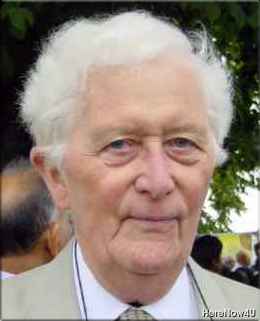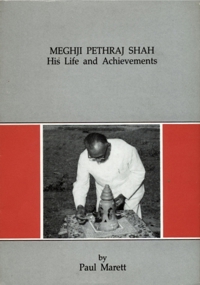
Thus, far from being inactive in retirement, Meghjibhai was engaged in new business ventures for the benefit of the charitable trusts. He made investments in various U.K. companies. A shipping company in North Wales was one venture. Oshwal Investments was the investment arm of his business whilst Premchand Raichand London was utilised as a financing company. Alfred Dent & Company continued in the commodity business. The former head of the company stayed on and Meghjibhai was not actively involved. To start with, Meghjibhai was cautiously sounding out the British business scene, looking at commercial opportunities with a critical eye and not taking chances. The first years were largely exploratory, seeking avenues for investment. Tragically, his life was to be cut short before he could fully develop the London business.
Among those who knew Meghjibhai well at this time was Mr. Frank Goldstein, his accountant. Mr. Goldstein, a Chartered Accountant, first came to know Meghjibhai around 1958. One of the clerks in Mr. Goldstein's firm, Andrews and Company (later, in 1972, merged with Lubbock Fine), was a Mr. D.N. Shah who was a naturopath and treated Meghjibhai for an ailment. He introduced Meghjibhai to Mr. Goldstein and the relationship lasted until Meghjibhai's death. Mr. Goldstein well remembers Meghjibhai's shrewd business acumen and particularly his remarkable ability at mathematics and accounts. Indeed, he says, Meghjibhai would have made a good accountant, high praise indeed from a distinguished member of that profession! Mr. Goldstein came to know Meghjibhai quite well and still remembers him with admiration. Meghjibhai, as he remembers, was rather withdrawn in manner and was not very forthcoming in conversation, yet he had a pleasant and engaging expression, he was nowhere near so severe as he appeared in a photograph, which Mr. Goldstein pointed out. He was religious, perhaps even slightly superstitious, though there was no shrine on view in his house: religion to him was a matter of behaviour, not ritual. He was careful about his health but by no means hypochondriac. In personal appearance he was always well dressed and well turned out, almost dapper in his dark suit and formal shirt. Meghjibhai was always frugal in his way of life and cautious about spending money. In his time in London he had no chauffeur, and, although he owned a car, he did not drive the car himself: he would arrange meetings so that Mr. Goldstein could pick him up. He would often do the shopping with Maniben and remarked, for example, how expensive almonds were (for he liked to eat same of these every day). An amusing example of his simple way of life was when he asked his son-in-Iaw, Madhoobhai, on one occasion to smuggle into the wardrobe same 'seconds' shirts which he had bought in a sale, so that the family would not know! But he was careful with money not only for his own sake. He was offered a large holding in an old-established Calcutta-based Raj company, Turner Morrison, but after he foresaw same difficulties, he pulled out. When he was introduced around to various important contacts at a series of expensive lunches at top-class hotels and restaurants, he would sit through them with composure, with tomato soup and a dish of vegetables for his own meal, but he would insist that he that he personally and not the company, paid the bill. Eating out could be a bit awkward for Meghjibhai: sometimes he would see the English dishes and not have the slightest idea w hat they would taste like.
Meghjibhai's solicitors in London were the well-known firm of Coward Chance (now Clifford Chance). The first work, which they did for him, in fact, was not concerned with his business interests but was the conveyance of his house in Hodford Road. Thereafter he had many dealings with them and Mr. P.A.J. Boyce (now retired) and Mr. T.G. Woodburn (who is now a senior partner in Clifford Chance) knew him well. He would come to the solicitors with his transactions completed and would ask for the arrangements to be put in legal form. One of Meghjibhai's characteristics was his readiness to take advice from the experts, but he also had the sort of personality, and the reputation in his community, to lead others to seek advice from him as well in the areas of his own expertise. Sometimes, of course, things went wrong, and his solicitors would get a visit from him to sort matters out. He was sensitive, not talkative, but willing to talk if you wanted to: his English was not at all bad. Mr. Woodburn remembers one moral, ethical conversation about everyone wanting to achieve the good. He based his conduct on religious principles but did not wear his religion on his sleeve. Once, half seriously, he said it would be fine to be reincarnated as an elephant. His manner was pleasant and cheerful: his amused eyes behind the heavy spectacles softened the severity of his strong face. He had an incisive, slightly dramatic style: 'Mr. Boyce, do it now!' Meghjibhai undoubtedly enjoyed the business of making money, just as he got satisfaction in giving it away. He was straightforward, not devious, simple in his approach but he could be firm, indeed tough, when the situation warranted this. Nearly a quarter of a century after his death Meghjibhai remains clear in the memory of those who knew and worked with him. Mr. Woodburn said, without further explaining it, 'He was different from other Indians'.
Although Meghjibhai had never had an English education, in his years in Africa he had constantly to use the English language in his business undertakings. With his keen memory, an irrepressible thirst for knowledge, strong will-power, and self-confidence, he acquired a useful command of English over the years. For a man from Gujarat with no more than a village primary school education in Dabasang it was no small undertaking to look after the administration of a large-scale business from an office in the heart of London. The Indian leaders who had struggled for the freedom of India had the advantage of an advanced education in the U.K. Meghjibhai had none of these advantages but he never suffered from an inferiority complex on that score. What he had missed in formal schooling he had made up by his experience in life. Hence he was under no handicap in his dealings with prominent British businessmen, lawyers and accountants. His capacity to grasp the substance and all the implications of any matter discussed in English was frequently a source of astonishment to the English people with whom he had dealings. The secret of this lay in his insatiable curiosity, his ever-present readiness to learn new things. Meghjibhai could easily have employed English managers to look after things for him. But it was not in his nature to be dependent on others and he would have missed the satisfaction of self-reliance and independence.
London is full of life and activity all the time. People work hard and the great city is astir by day and night. Everybody is short of time to pack in all the things they want or need to do. There is an unceasing roar of traffic. At night the city is ablaze with lights. Theatres, cinemas, clubs, hotels, entertainments are available for the enjoyment of Londoners. Businessmen entertain their clients at lunch or dinner with good food and wine, and much business is transacted on such occasions. Social functions of all kinds, meetings with politicians, business conferences, are all conducted in this spirit and bring together businessmen from all parts of the world. Such gatherings satisfy the self-esteem of those invited. It is considered essential to hold such functions all the time in order to expand business. To many people it is inconceivable that business could be conducted except over a drink (which to an Englishman means an alcoholic drink). Some, indeed, see this as a vicious circle from which it is impossible to escape.
Meghjibhai kept clear of this business social round. Whilst he was fully aware of the addictive pleasures of the world he was not seduced by them. He took the view that it was only when a man was lacking in business ability that he had to resort to flattery and lavish entertainment for prospective clients. 'Men who resort to bribery and corruption are not real merchants', he would say. Indeed, he never felt any need to gratify his own senses with needless luxuries. He remained untouched by the voluptuous aspects of London life. As always he remained a strict vegetarian and non-smoker and did not touch alcohol. He did not go to the cinema and his main relaxation was his early morning game of 'rummy'. He played cards for pleasure: the idea of gambling on cards for money would not have entered his head. He was willing to adopt the good qualities of English society but did not fall into those habits of which he did not approve. If occasionally somebody commented on his puritan way of life he would smile and say 'That sort of thing is alright for an educated man. But I am a simple uneducated fellow!' The other person would find that there was no answer to that.
 Dr. Paul Marett
Dr. Paul Marett

